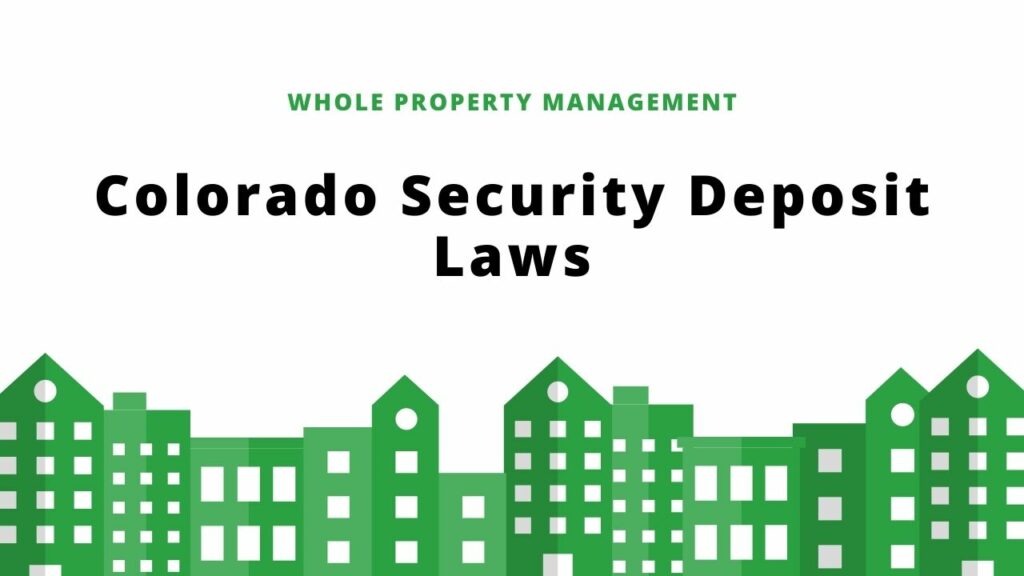Colorado Security Deposit Laws

Colorado security deposit law regarding security deposits is set up to protect both landlords and tenants through the storage and use of a security deposit. So, as a landlord, you must follow these rules whenever you ask for a security deposit from your tenants.
With this in mind, we at Whole PM have put together this article to help all landlords understand Colorado’s security deposit laws when it comes to their rental units:
Is there a limit to the value of a security deposit?

No, there is no limit. Landlords can charge whatever amount of security deposit they wish in Colorado, unlike in some other states.
That said, you will still want to charge your tenants a reasonable amount as asking for an unreasonably high-security deposit could turn off prospective tenants.
Can you ask for additional security deposits from a tenant?
Yes, the Colorado Landlord-tenant laws do allow you may ask for an additional deposit for a specific reason – such as a pet deposit. A pet deposit is a one-time, refundable fee that you can use to cover property damage and losses caused by tenants’ pets.
Please note, that according to the Fair Housing Act, disabled tenants are entitled to full and equal access to housing and so you cannot charge a pet deposit for a service animal or anything else covered by the Fair Housing Laws.
Can you charge a non-refundable security deposit?
No. The state of Colorado considers security deposits as the tenant’s property. So, landlords can only hold security deposits as a financial cushion against possible lease agreement violations.
Do Colorado landlords have to hold their tenants’ deposits in a certain way?
No, unlike some other states, Colorado’s security deposit law doesn’t require landlords to store their tenants’ deposits in a particular way. Colorado security deposit laws state that there are no requirements to store the tenant’s security deposit in an interest accruing account or to post it as a surety bond.
Additionally, landlords in Colorado do not need to send a written notice of any kind of proper notice to their tenants that they have received the tenant’s security deposit.
Are there justifiable reasons for keeping a tenant’s security deposit?
Landlords have the right to keep a tenant’s full security deposit, as long as the reason is legally justified or breaks the lease. In Colorado, you may have a right to deduct your tenant’s deposit for any of the following reasons.
- Unpaid rent: If the tenant fails to pay unpaid rent during the tenancy on your rental property, security deposits in Colorado can be deducted to replace the payment.
- Abandonment of the premises: Should the tenant abandon their rented premises, security deposits in Colorado can be used to recover any unpaid fees, reasonable attorney’s fees, or court costs related to them leaving.
- Unpaid utility bills: If the tenant leaves any unpaid bills when they vacate the property, the security deposit can be used to recover any losses.
- Unpaid repair bills: If the tenant leaves the property in a state of disrepair, the security deposit can be used to cover repairs but it cannot be used to cover normal wear and tear.
- Unpaid cleaning bills: Should the tenant leave the property in a state where it would require professional cleaning, then the security deposit can be used to cover the cost.
What is Normal Wear and Tear?

‘Wear and tear’ is termed as the normal deterioration of a property or appliance over time. As such, you cannot make any deductions to your tenant’s deposit to fix the damage if the damage is ‘wear and tear’. The following are some examples of what constitutes normal wear and tear:
- Faded paint
- Torn wallpaper
- Discolored grouting
- Faded carpets
- Silvering of a bathroom mirror
- Loose hinges or door handles
- Faded blinds or curtains
Any other type of damage a tenant can cause to your rental unit is called ‘unusual’ or ‘excessive’ damage as this occurs as a result of a tenant’s negligence, carelessness, abuse, or misuse. You must provide a written statement of all of the deductions you make.
Colorado landlords have a right to hold their tenants accountable for the cost of damage. So, if they move out without fixing the damage, you have a right to make appropriate deductions on their deposit. Here are some examples of negligent property damage that should be included in a written statement.
- Illegal property alterations
- Holes in the walls
- Chipped tile flooring
- Excessive grime in the oven
- Mold growth in the refrigerator
- A broken bathtub enamels
- A clogged toilet due to misuse
- Broken closets or doors
Do tenants in Colorado have a right to a walk-through inspection?
Landlords perform walk-through inspections to inspect their property’s condition relative to the move-in condition. So, if there is damage, the tenant gets an opportunity to fix the issues before moving out.
However, tenants in Colorado don’t have a right to a walk-through inspection prior to moving out.

When must you return your tenant’s deposit after they move out?
Generally, landlords have one month after a tenant moves out to return their tenant’s deposit. However, if your lease agreement or rental agreement specifies it, you may have up to 60 days.
So, if you make deductions to your tenant’s deposit, you must include a written itemized statement alongside the deposit you’re returning to the tenant.
If you fail to return it on time, you risk forfeiting all rights to withhold any part of it. You may also be liable for paying the tenant up to 3X the amount you’ve wrongfully withheld.
Bottom Line
Understanding the Colorado landlord-tenant laws when it comes to security deposits is very important for any landlord looking to operate successfully in the state. So, if you have any questions regarding the management of a security deposit, Colorado law, or anything else, it’s a good idea to reach out to a professional rental management company.
So why not contact us at Whole PM today?
Disclaimer: This content isn’t a substitute for professional legal advice. Also, laws change, and this content may not be updated at the time you read it. If you have a specific question or need help in any aspect of managing your rental property, please get in touch with our team.
